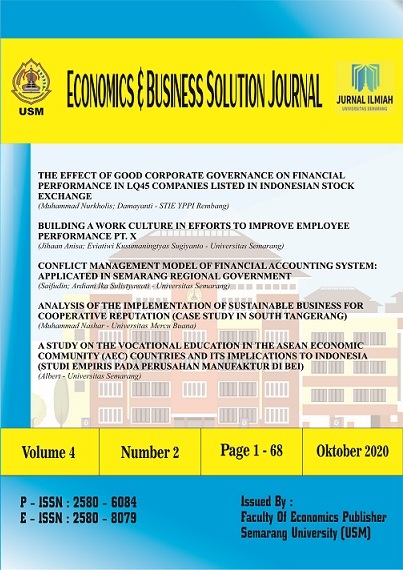A Study on the Vocational Education in the Asean Economic Community (AEC) Countries and ITS Implications to Indonesia
DOI:
https://doi.org/10.26623/ebsj.v4i2.2799Keywords:
ASEAN Economic Community, Vocational Education.Abstract
ASEAN Economic Community (AEC) is a regional program which started in 2015, was developed by members of ASEAN countries which have agreed on pillars on mutual collaboration to increase the economic and social growth. The AEC has agreed to carry out four major pillars: (1) single market and production base, (2) competitive economic region, (3) equitable economic development and (4) integration into global economy. The four pillars are divided into 17 core elements, and among the core element, there is one particular core element which focuses on human resources which is the free flow of skilled labours. The government of the ASEAN countries have taken actions towards anticipating the ASEAN Economic Community (AEC), especially in regards to the free flow of skilled labour. One of actions is improving the quality of education. Some countries have invested high amount of funds in order to increase the quality of graduates. Indonesia has also started to make improvements in the quality of education. One of the improvement was in the form of constructing Indonesian Qualification Framework (IQF) which were then obliged for all education institution to follow. However, related to the vocational education, more beneficial collaborations with the industry should be carried out. Also, other soft skills which are required in workplace still need to be formally included in the assessment process of the educationReferences
Abdelkarim, A. 1997. Technical and vocational education and training in the Philippines: experience and views of trainees. International Journal of Manpower, 18(8), 675-701.
Cheng, I. H. 2010. Case studies of integrated pedagogy in vocational education: A three-tier approach to empowering vulnerable youth in urban Cambodia. International Journal of Educational Development, 30(4), 438-446.
Kamibeppu, T. 2009. Education reform context and process in Vietnam. In The political
economy of educational reforms and capacity development in Southeast Asia (pp. 169-189). Springer, Dordrecht.
Milio, S., Garnizova, E., & Shkreli, A. 2014. Assessment study of technical and vocational education and training (TVET) in Myanmar. ILO.
Moenjak, T., & Worswick, C. 2003. Vocational education in Thailand: a study of choice and returns. Economics of Education Review, 22(1), 99-107.
Phetsiriseng, I. 2009. Education reform context and process in Lao PDR: Focusing on basic education. In The political economy of educational reforms and capacity development in Southeast Asia (pp. 265-282). Springer, Dordrecht.
Setnas ASEAN. 2019. Tujuan ASEAN; http://setnas-asean.id/news/read/tujuan-asean-lengkap-dengan-sejarah-berdirinya-dan-pembentukan-komunitas-asean
Seameo. 2017. Guidebook To Education Systems And Reforms In Southeast Asia And China.https://www.seameo.org/SEAMEOWeb2/images/stories/Publications/Centers_Pub/2017SEAMEOChina/GuidebooktoEducationSystemsandReforms.pdf
Soysouvanh, B., Khammounty, B., Virivong, S., Phoumilay, P., Elsholz, U., & Bohlmann, T. 2013. Developing standards of vocational teacher at bachelor level in Lao PDR. TVET@ Asia, 2, 1-19.
Thanh, P. T. H. 2006. The development of the higher education sector of Vietnam within
the globalization discourse: Using futures methodologies. Journal of Futures Studies, 11(2), 35-60.
Triyono, M. B., & Moses, K. M. 2019. Technical and Vocational Education and Training
and Training in Indonesia. In Vocational Education and Training in ASEAN Member States (pp. 45-79). Springer, Singapore.
Unesco. 2014. Education Systems in ASEAN+ 6 Countries: A Comparative Analysis of Selected Educational Issues. UNESCO Office Bangkok.
Wahyuni, T., & Safitri, D. 2018. Analisis Faktor-Faktor yang Menentukan Keberhasilan
Penerapan Kurikulum 321 pada Pendidikan Vokasi. In Prosiding Seminar Nasional Pendidikan Tinggi Vokasi Indonesia.
Yue, C. S. 2011. Free Flow of Skilled Labor in the AEC. Singapore Institute of International Affairs, Singapore.
Downloads
Published
Issue
Section
License
The journal holds the copyright for each article published with work licensed simultaneously under a Creative Commons Attribution 4.0 International License, which allows others to share the work with an acknowledgment of the authorship and early publication of the work in this journal.







